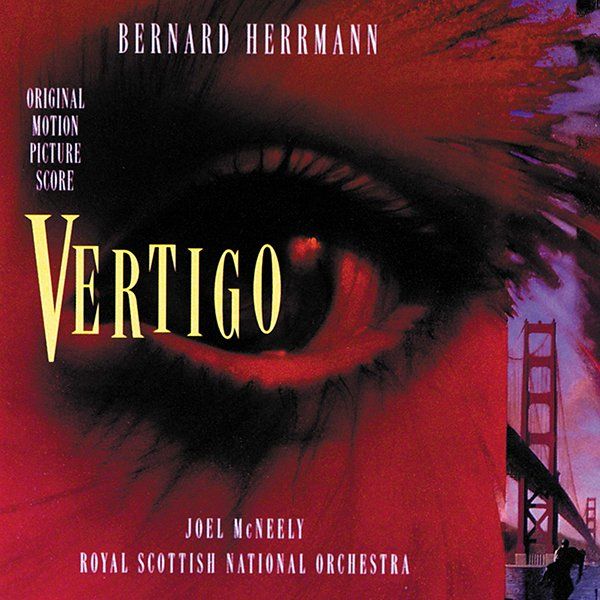Vertigo

Label: Varese Sarabande
Catalogue No: VSD 5600
Release Date: 1995
Total Duration: 62:40
UPN: 0-3020-65600-2-2
Joel McNeely conducts the Royal Scottish National Orchestra
Joel McNeely conducts this very welcome recording of Herrmann’s VERTIGO, which features nearly thirty minutes of music not included on the original Mercury soundtrack album. Although still about ten minutes short of being complete, it manages to cover most of the score’s major moments, resulting in a new appreciation of the structure of the score. Now it is possible for instance to trace the development of Madeline’s theme through several of its incarnations, from its tentative beginnings in “Madeline’s First Appearance”, through the dreamlike beauty of the high strings in “The Flower Shop” and “The Graveyard”, to the elegant yet seductive “By the Fireside.” A surprising and disappointing omission however is the short cue “The Outing”, in which the first stirrings of the love theme are heard, as it grows out of Madeline’s theme. As a matter of fact, the love theme in general is given short shrift, with almost none of its early appearances included to build the foundation for its ultimate transfiguration in the “Scene D ‘Amour”.
Some of the other new highlights include the subdued, disquieting “The Forest”, an exercise in controlled gloom and mystery (with a particularly effective passage for vibe chords hovering ethereally above an eerie wash of electric organ and cymbal roll), the innocence and unabashed romance of “The Park”, and the utterly haunting “The Letter”. In part of this cue, Herrmann uses a deceptively simple method to create one his most beautiful and inspired pieces. The sequence begins with a simple four note phrase in the strings. Other strings gradually add harmony to each repetition of this phrase until minor variations take it to a new realm of poignancy and yearning. The current recording is marred however by the sudden, unexplained disappearance of one of the high violin parts in the sequence’s last four bars, which substantially changes the attitude of those bars.
On the whole, this disc falls a little short of McNeely’s inspired and technically superb CD of FAHRENHEIT 451 and other Herrmann works. Although McNeely’s grasp of the music is usually right on, a few nuances of tempo and dynamics are occasionally glossed over. Nitpicking aside, the CD is, for the most part, a faithful document of one of Herrmann’s finest scores, and should be praised for the large amount of new music it contains.



